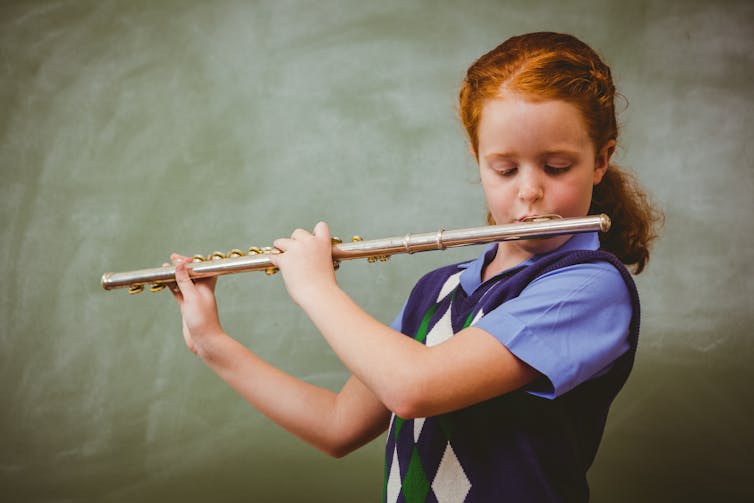Negative Effects of Education Does Not Include Visual Arts
Maths, scientific discipline and literacy have been the focus of British schools for many years. These subjects are accounted to have greater currency in a competitive global economy. Contest with the international education organization has also led to greater focus on these subjects in our schools.
Just should more attending be given to the arts? In the The states, concerns are being raised nigh the failing emphasis on arts in pedagogy following the No Child Left Behind Deed. In the UK, there have also been calls from various sectors, MPs included, for greater accent on the arts in school.
The Firm of Lords recently argued for arts to be part of the core curriculum to encourage the development of creativity, disquisitional thinking, motivation and self-confidence – skills necessary for innovation. Such skills are besides believed to help children learn academically.
According to the Telegraph, fewer students are now taking arts subjects because of government reforms and a focus on the EBacc or English language Baccalaureate, which focuses on English, maths, history or geography, the sciences and a linguistic communication.
A report past the University of Warwick warned that information technology is children from low-income families that would exist virtually desperately affected as a result of this, and recommended that arts exist included in the EBacc. Mike Leigh, the Oscar-honour winning managing director, said that it was ridiculous to think of arts every bit the preserve of the privileged, and that "art should be a core subject of all subjects, like English is, but even more so".
Many of these arguments hinge on the belief that arts educational activity is linked to academic attainment. But a systematic review carried out by myself and Dimitra Kokotsaki suggests that evidence for the academic benefits of arts education is unclear.
Looking at 199 international studies, covering pre-school through to 16-twelvemonth olds, we establish that there are as many studies showing that arts participation in schools has no or negative impact on academic attainment and other not-academic outcomes every bit there are positive studies. Very few studies could establish a causal result of arts participation.
We looked at studies on a wide range of subjects, including visual arts, music, dance, theatre, hip hop, poetry and creative writing.

Then what does work?
Tentative evidence does propose that both music preparation and integrating drama into the classroom may have beneficial furnishings.
Playing an musical instrument benefits inventiveness, spatial-temporal power, IQ scores and reading and language. Some studies also suggest that information technology tin can improve self-concept, cocky-efficacy, motivation and behaviour for secondary school children. Music education shows promise for learning outcomes and cognitive skills beyond all historic period groups.
Listening to music, however, does not seem to have a positive impact. Or at least there is no testify to suggest that it does. Some studies showed that people who listened to classical music performed worse in retentiveness tests than those who didn't. Results of experiments of the Mozart upshot take produced conflicting results.
At that place is also no show that engagement in visual arts, such as painting, drawing and sculpture, tin can improve academic performance. Effects on other non-arts skills such as creative thinking and cocky-esteem were too inconclusive.
Because of weaknesses in these studies, and the lack of replication and inconsistent findings across them, the findings must be interpreted with circumspection. More robust and rigorous evaluations are needed to ostend any causal links.
Simply if improving attainment is the aim, then arts may not exist the solution. Promising programmes already be that can boost learning. Given the lack of prove so far, perhaps we should think more broadly virtually the purpose of arts in the context of educational policy. Can it not be just for enjoyment? Must it have a utilitarian function?
The evidence we have now is just not good enough yet for us to make conclusive statements and more robust enquiry is clearly needed. But of class at that place is an statement for pursuing arts teaching for its own sake – for enjoyment and appreciation.
If the arts brand children happy and feel good most themselves, give them a sense of achievement and assist them to appreciate beauty, then that is justification in itself.
campbellaunuentid.blogspot.com
Source: https://theconversation.com/arts-education-may-be-important-but-the-academic-benefits-are-unproven-50496
Postar um comentário for "Negative Effects of Education Does Not Include Visual Arts"